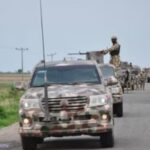
The United Nations Development Programme says peace is a “prerequisite” to transform Nigeria’s enormous potential into socio-economic prosperity as the country pulls away from the consequences of Boko Haram violence that’s destabilized the north east of the country.
The resident coordinator of the UN and representative of the UNDP spoke in Maiduguri in commemoration of International Day of Peace, which focuses on respite, dignity and safety.
“We cannot afford to overlook the many challenges and threats to peace and human security in the country, including the Boko Haram insurgency, farmers-herders conflict, the agitations for secession, kidnappings for ransom,” said UNDP’s peace and development advisor Zebulon Suifon, in comments delivered on behalf of the UNDP representative.
“Together, let us explore peaceful and non-violent ways of resolving differences, ensuring justice for all, and protection of human rights and dignity for all citizens.”
The number of refugees and internally displaced populations in the world has exceeded 65 million, with more than 10 million people stateless—the highest figure since record began before World War II.
Thirty percent of the refugees and IDPs are in Africa, and Nigeria accounts for a higher percentage, said Suifon.
And many of them face “uncertain future with difficulties in accessing a decent education, employment, health and security.”
The International Centre for Peace and Conflict Resolution has produced policy briefs detailing root causes fuelling conflicts across the country, including why young people are being “daily sucked into drugs and extremism,” said its director-general Osita Osita.
“We are resolved to stop the re-emergence of situations that midwifed the present violence,” Osita said.
But Borno, which has been the centre of displacement of people from their homes in the last five years of Boko Haram violence, is focused on reconstruction.
Borno’s justice commissioner Kaka Shehu, speaking on behalf of Governor Kashim Shettima, said the state capital was chosen for Nigeria’s marking of International Peace Day because it has been the epicentre Boko Haram insurgency or the terrorist group’s capacity to unleash terror has reduced, making Maiduguri a safe location.
Last month, the state launched an agency for community development, providing finance for residents to access loans.
“We have secured release of more than 100 Chibok girls and we await the release of the rest. We are ready to collaborate to bring normalcy so that reconstruction can continue,” Shehu said.
More than 20,000 people have killed since 2009 and 2.9 million residents driven out of their homes. Around 1.9 million people are classified as internally displaced, said Ambassador Ahmed Bala, speaking on behalf of foreign affairs minister Geoffrey Onyeama.
Around 7 million people—half of them children—need humanitarian assistance.
“It is important that support be scaled up at national, regional and international level,” said Bala.
“The need for safety and protection of civilians in the troubled north east and Lake Chad region must be taken seriously.”
 Join Daily Trust WhatsApp Community For Quick Access To News and Happenings Around You.
Join Daily Trust WhatsApp Community For Quick Access To News and Happenings Around You.

